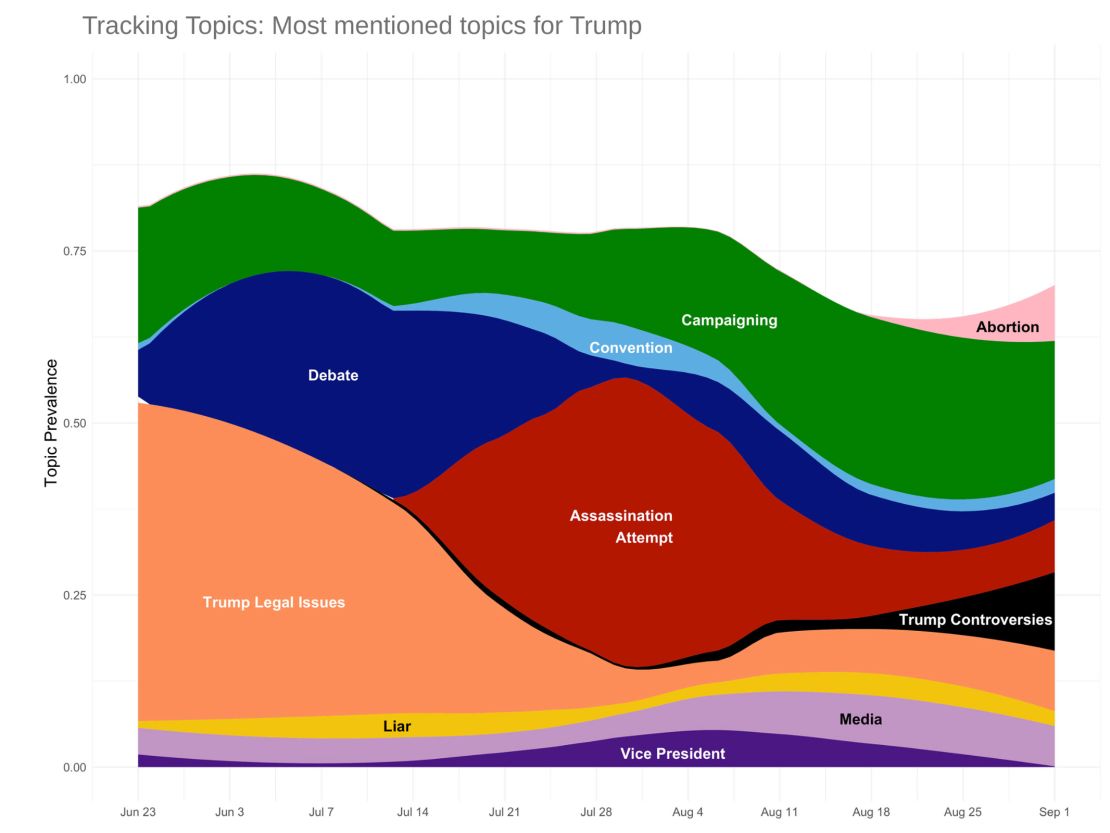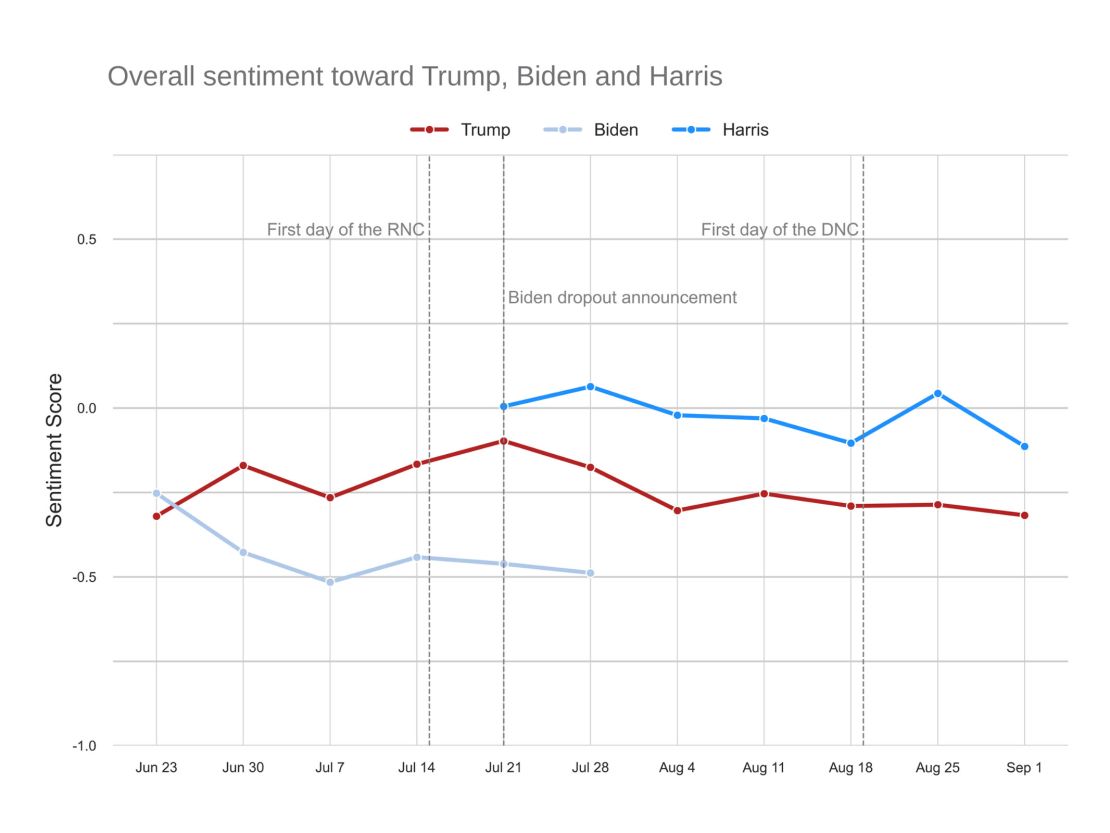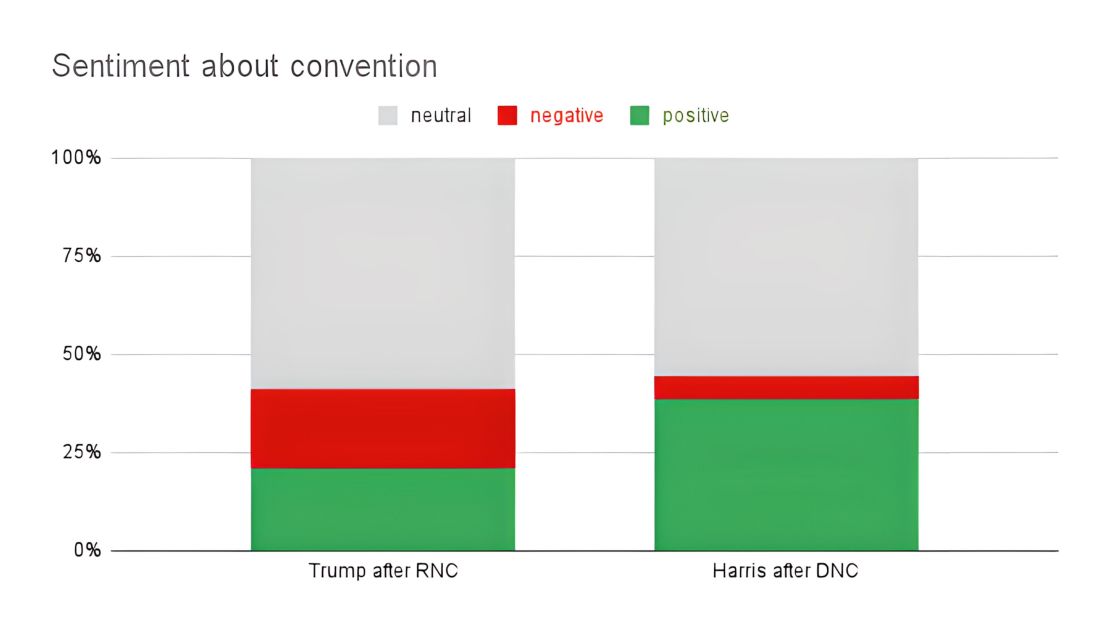Across the weeks leading up to Tuesday’s presidential debate, the news Americans have been hearing, reading and seeing about Vice President Kamala Harris and former President Donald Trump has continued shuffling, with the topics that resonate about each candidate shifting week to week.
That’s a change from the past two presidential campaigns. Results of similar surveys in 2016 and 2020 found that the news and information that broke through to Americans about at least one candidate in those elections were consistently dominated by one issue throughout the course of the campaign – emails around Hillary Clinton in 2016 and the ongoing coronavirus pandemic for Trump in 2020. This time around, there hasn’t been any such dominant issue for either candidate since CNN began tracking these results in mid-June.
That’s the key takeaway from the latest round of data from The Breakthrough, a collaborative research project from CNN, the University of Michigan and Georgetown University, conducted by research firms SSRS and Verasight. The surveys, which collect responses from a new group of roughly 1,000 representative Americans each week, run each Friday through Monday.
Data collected around the time of the Democratic National Convention showed the party’s gathering driving the campaign conversation around Harris that week, with those reporting they had heard about the Democratic conclave using more positive words about it than those who’d heard about the Republican Party’s convention in July had done at the time.
And through the Labor Day weekend, discussion of Harris focused largely on the interview she did with CNN, her first major sit-down since becoming the Democratic nominee for president.
For Trump, by contrast, the most recent data reveals a spike in mentions of news about his appearance at Arlington National Cemetery, during which his campaign ignored a cemetery official’s calls not to film the former president in a section that is reserved for those who lost their lives in recent military action. Mentions of “abortion” also crack the top five for Trump this week, the only policy-related word to do so since the survey began, aside from mentions of “Project 2025” in mid-July.
The spike in responses around a single topic marks a departure from recent trend around Trump in the Breakthrough data. The conversation around Trump’s campaign in the time after his party’s convention in mid-July and up through the end of the Democratic convention in late August was notable for its lack of a dominant theme or focus on a single new development. Americans reporting they had heard about Trump’s campaign were using a range of words, with the most common focused on the day-to-day of a presidential run. There were roughly twice as many mentions of “Arlington” alone in the most recent data as there were mentions in the preceding week of “campaign,” that week’s most commonly used word.
These campaign-related words are still a frequent feature of Americans’ reports about what they’ve heard about Trump, but in the most recent data, they are joined by news about his Arlington visit. In survey data collected in the days after the Democratic convention, 25% of respondents mentioned something related to Trump’s campaign activity, with the next most frequently mentioned topic (opinions about Trump) at 9% of all mentions. In the most recent data, 24% mention something related to campaigning, with 17% saying something that touches on the Arlington visit or the controversy around it.

Overall sentiment in Americans’ reports of what they have seen, read or heard about each of the candidates has been consistently more positive for Harris than for Trump, though for both, recent trends suggest at least somewhat more negative sentiment than positive. Over the past two weeks, Harris’ numbers climbed into net positive territory around the DNC and then settled back to their pre-convention level in the week after. Harris appears to have received a larger boost on this metric from the Democratic convention in Chicago than Trump did from the Republican gathering in Milwaukee.

Comparing the data collected shortly after the DNC with that collected just after the Republican National Convention, there is a notable difference in tone overall. While the bulk of the responses mentioning that someone had heard something about each convention were neutral, those who did express a sentiment were far more positive toward Harris after the DNC than they were toward Trump after the RNC.

News about Trump’s convention was largely overshadowed in the public’s view by news about the assassination attempt against him shortly before the convention began: 61% of respondents mentioned that in the week after Trump’s convention, compared with 23% who mentioned something about the convention. For Harris, though, the convention was by far the most frequently mentioned topic of its moment: About 40% of respondents mentioned something convention-related, nearly twice as much as the next most frequently cited topic that week, her campaign at 21%.
Around 7 in 10 Americans in the most recent poll reported hearing some news about each of the two major candidates, about the same as during each of the previous two weeks. The upcoming debate could prompt a shift in those numbers though: Shortly after the first presidential debate in late June, the share reporting that they had heard something about Trump climbed from 77% to 83%, with the share saying they’d heard news about Joe Biden rising from 71% to 83%. (Biden dropped out of the race the following month and endorsed Harris.)
That latest data also marks a spike in attention to Robert F. Kennedy Jr. as he ended his independent bid for the presidency and threw his support behind Trump. Over the past two weeks, about 6 in 10 Americans reported having heard something about Kennedy, higher than at any point since The Breakthrough began tracking impressions of the race in late June. Overall, 61% said they had heard something about Kennedy in the most recent week, 20 points above his pre-dropout high mark of 41%.
Demonstrating the limited impact his campaign had on the national conversation around the presidential race, over the entire course of the survey, there were more mentions of dropping out for Kennedy than any other word.
CNN’s Ariel Edwards-Levy and Edward Wu contributed to this report.











